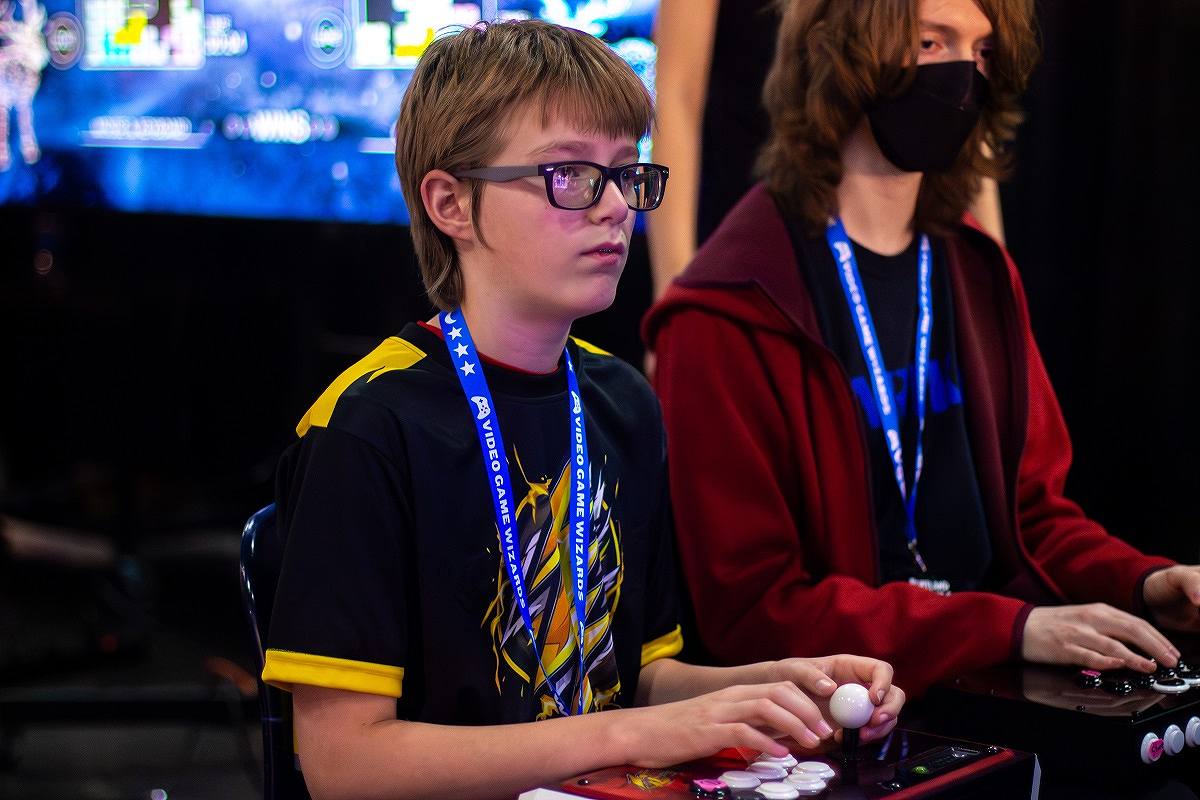
Willis Gibson plays in the Classic Tetris World Championship in October at the Portland Retro Gaming Expo in Oregon. Willis, a 13-year-old “Tetris” phenom who plays as “Blue Scuti,” placed third in the tournament.
14:48 JST, January 6, 2024
Willis Gibson spent more than a half-hour on Dec. 21 commanding a seemingly endless waterfall of blocks as they shot down his screen at a faster and faster pace. Then, at the 38-minute mark, the blocks stopped.
For seemingly the first time ever, a human being beat “Tetris.”
From his bedroom in Stillwater, Okla., the 13-year-old who plays as “Blue Scuti” became the first person to drive the classic Nintendo Entertainment System game to a “true kill screen” – the term top players like Willis use to describe when the game freezes because it can’t keep up with score computations, said David Macdonald, a professional “Tetris” player. Willis’s achievement shattered a decades-old belief that the game was unbeatable, dogma that came into question only in recent years after an artificial intelligence program tripped the kill screen and professionals developed more efficient techniques of handling the original Nintendo controller.
“No one was even remotely close to this until just a couple of years ago,” said Macdonald, who goes by the nom de guerre and produces “Tetris”-related content as “aGameScout.”
Willis started getting into the original 8-bit NES version of “Tetris” as he started sixth grade at the end of summer 2021, he told The Washington Post. He had been playing a newer version with his brother on Xbox, but after seeing a YouTube video from Macdonald, he decided to try his hand at the classic edition.
“I like it because it’s simple to learn at the beginning, but it’s really difficult to master,” he said of the game in which players try to organize six different shapes into unbroken rows, thus making those rows disappear, before blocks stack up to the top of the screen.
In the nearly 2½ years since, Willis has emerged as one of the best players in the world. He’s won regional tournaments, and in October, placed third at the Classic Tetris World Championship – the game’s premier competition. He’s won between $3,000 and $4,000 in prize money.
Willis’s mother, Karin Cox, said she’s not worried about her son overdoing it on Tetris or other video games. Willis, who estimates that he plays an average of two to three hours a day, does a good job regulating his playtime. He also has other interests, which include playing clarinet in his junior high band, riding his bike and bowling.
And competitive gaming has enriched his life, his mother said. Playing Tetris is about more than breaking records and winning money. Willis has become part of the professional “Tetris” subculture. He’s made friends with whom he has a “friendly competitiveness.” Older players have mentored him.
“The community is absolutely wonderful,” she said.
Around the time Willis started playing, a software engineer created a “Tetris”-playing AI model called StackRabbit that made it to Level 237 before getting a true kill screen, MacDonald said. Knowing it could be done led players to pore over the game’s code to learn what might induce the game to freeze.
At the same time, players were mastering a new, more efficient way to handle controllers. Willis experienced that evolution firsthand as he was entering the competitive “Tetris” scene. At the start, he like most other players used a control technique in vogue at the time called hypertapping, in which players tense up their fingers, allowing them to rapidly press buttons.
But in the months that followed, more and more pros transitioned to a new method called the “rolling technique,” in which players use multiple fingers to repeatedly tap the back of the controller in quick succession, pressing the buttons on the front into the players’ fingers. Willis came to the conclusion that if he wanted to compete at the top levels, he would have to adopt it.
In early 2022, he made the switch and started his two-year ascent to the top levels, which culminated in his game on Dec. 21.
Willis was live-streaming through the gaming site Twitch where his fellow “Tetris” aficionados were quick to congratulate him. In the days leading up to that game, Willis had gotten close to inducing a true kill screen. About 38 minutes into the game that would rock the “Tetris” world, he spotted a chance on Level 156 to drop a block into a space he knew would induce a kill screen.
“Please crash,” he said.
But he missed the spot, and the blocks continued to zip down the screen.
Then, he advanced to Level 157. A few seconds later, he dropped a blue “L” shape into the left corner, completing and evaporating a row. But instead of spitting out the next piece, nothing came, and the background music – Tchaikovsky’s “Dance of the Sugar Plum Fairy” – cut out, replaced by a monotonous hum.
A moment passed before Willis realized what had happened. Until then, every one of the millions and millions of human-played Tetris games had ended the same way: The blocks came too fast for the player to handle and stacked up – game over.
When the realization washed over him, Willis started heaving quick, deep breaths as he put his hands to his head and his eyes grew wide.
“Oh my god!” he said in a high-pitched wheeze.
He slumped in his chair and then jolted forward as he bent over and held his head in his hands. The deep breaths kept coming and so did the Oh my gods.
“I’m going to pass out,” he said later.
After a couple minutes, his breathing slowed, returning to something approximating normal. He laughed, tossed his head back, closed his eyes and smiled.
“I’m shaking so bad.”
Then there was a beat or two of silence, except for the glitched-out flatline of a defeated computer.
Top Articles in News Services
-

Survey Shows False Election Info Perceived as True
-

Hong Kong Ex-Publisher Jimmy Lai’s Sentence Raises International Outcry as China Defends It
-

Japan’s Nikkei Stock Average Touches 58,000 as Yen, Jgbs Rally on Election Fallout (UPDATE 1)
-

Japan’s Nikkei Stock Average Falls as US-Iran Tensions Unsettle Investors (UPDATE 1)
-

Trump Names Former Federal Reserve Governor Warsh as the Next Fed Chair, Replacing Powell
JN ACCESS RANKING
-

Producer Behind Pop Group XG Arrested for Cocaine Possession
-

Japan PM Takaichi’s Cabinet Resigns en Masse
-

Man Infected with Measles Reportedly Dined at Restaurant in Tokyo Station
-

Israeli Ambassador to Japan Speaks about Japan’s Role in the Reconstruction of Gaza
-

Videos Plagiarized, Reposted with False Subtitles Claiming ‘Ryukyu Belongs to China’; Anti-China False Information Also Posted in Japan























